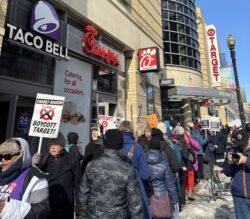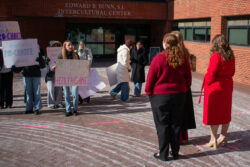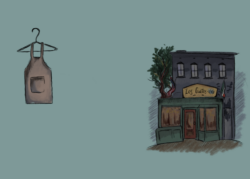Two months after President Bush declared the end of major combat operations in Iraq,New Yorker staff writer George Packer walked the dusty streets of Baghdad. Two trips and three articles later, Packer has witnessed the evolution of the postwar climate. During the New Yorker College Tour, the Voice spoke with Packer about his travels, the Bush administration and the situation on the ground in Iraq.
Do you think that with its new mandate the Bush administration will execute this war any differently?
That’s a very hard question to answer. My guess is no, I think we’ll see more of the same. We are seeing the personnel who got us into the war being repositioned in the second administration. I don’t think they were holding back, I don’t think they were waiting for political approval. They acted based on their own thinking without worrying about political approval. The questions are whether we will stay and what will we do if an elected Iraqi government tells us to leave. There’s no way of knowing, but my guess is it won’t happen overnight.
In his conversation with Seymour Hersch in Gaston Hall, New Yorker editor David Remnick said he had not received any calls from the administration regarding Hersch’s articles about the Abu Ghraib prison scandal. What do you think the implications are of the administration’s lack of interest in public opinion and the media’s response?
I think that is a strategy: “We’re not going to answer, we’re not going to get into that conversation because we can’t win it.” Their approach to the media all along has been, “We’ll find our favorites and talk to them.” Unfortunately that also was more or less the approach of the [Coalition Provisional Authority] in Baghdad, which at times felt like an offshore extension of the White House.
My guess is that there were people in the administration who were horrified by Abu Ghraib and who, if it were up to them, would do everything possible to bring the chain of decisions to light and to create some accountability, but they are not the most important people. The decisions of the most important people have always been to ride it out and not play the game with the press and assume that it will be largely forgotten. And Abu Ghraib really didn’t play much of a role in the campaign, and in that way their calculations might be correct.
No administration likes the press, but from what I took away from Ken Auletta’s piece on the White House press corps (“Fortress Bush,” the New Yorker, Jan. 19, 2004), this administration regards the press as an interest group that should be treated according to the level of its support, like any other lobby, rather than as a key institution of democracy. Again, I think that’s been the tendency probably since Vietnam, but it’s become more pronounced in this administration.
Do you think we have a responsibility to stay and try to rebuild? Where do you draw the line between staying and leaving?
We do have a responsibility, absolutely. We intruded in this country in a big way and the overthrow of Saddam was just the beginning, it wasn’t the end. The question is, at what point does our very presence become a force for worse. At what point would things have a better chance of moving toward a good outcome if we weren’t there?
The problem all along has been that our presence is, as people say, just enough to lose. We have enough people there to provide targets and create animosity but not enough to provide security and reconstruction. I think at least part of the answer all along has been an extra 100,000 troops. It’s not going to happen. It didn’t happen; it won’t happen. My guess is we will muddle along. I still have not yet reached the conclusion that our best service to the Iraqis would be to leave. I might get to there, but I’m not there yet because I do think it could be a lot worse than it is now.
In your article “The War After the War” (The New Yorker, Nov. 24, 2003) you wrote that the State Department’s pre-war Iraq research went unused by the Defense Department. Going into the war, do you think the administration planned to rebuild or to get out quickly?
They never made up their minds; some people thought one thing and some thought another. There was no clear guidance. The team that went in with Jay Garner, [Office of Reconstruction and Humanitarian Assistance], went in without knowing exactly what it was they were going to be doing and how long they were going to stay and what the goal was, and it has been improvised all along because of that.
We should have had an idea whether we were going to commit major resources to security and reconstruction or whether we were going to try to turn power over to Iraqis as quickly as possible and leave. So those were the basic points of view and they never really got resolved. People were starting things that were then terminated or undermined, and public officials were making statements that were completely at odds with other statements or with reality. This began with Rumsfeld saying that the looting meant that freedom had come to Iraq and freedom is untidy, and that this is what democracy looks like. Those statements meant that Rumsfeld didn’t want to be there anymore, that the job was done.
The people that you mentioned that had done the State Department’s Future of Iraq project were more inclined to think that the job was just beginning and would be a huge commitment. Some of those people did go to Baghdad but the project’s top guy did not and that was a sign that this point of view was not welcome. We’ll know a lot more when files are open, and we can read-if it ever happens-what documents were produced by the Office of Special Plans. I think the most you can say is that they never cohered around a policy for the post-war, so they were winging it from the beginning.
It might be too soon to tell, but how are people of Iraq treating their past and the legacy of Saddam? How are the people dealing with the role many of them played in his regime?
That conversation has sort of been put on hold because the present is all-consuming. People are tired of talking about Saddam; Saddam is the past to them. The fall of the regime happened pretty quickly; obviously these things don’t just disappear. It will come back; just as Germans began to ask questions about the Nazi period after 20 years, I think that will happen in Iraq too if it stabilizes. But right now, the present is the focus; people are not interested in the trial of Saddam, they’re not interested in digging up the files and finding out the history of the Baath party. Scores have been settled ever since the fall of the regime, but it’s happening quietly. Someone hears about a neighbor who got shot, and it turns out he was a Baathist. But that’s sort of in the shadows.
In your article “The Next Iraqi War” (the New Yorker, Oct. 4, 2004) you wrote about Kirkuk and the ethnic tensions there. Do you feel those tensions and differences can be reconciled? What role is the U.S. playing there?
Our role has been to separate the antagonists and to freeze the status quo so that new cycles of revenge do not begin and to try to create a mechanism for resolving these disputes. The process took a long time and very few people have a lot of faith in it, but the CPA created the Iraqi Property Claims commission to deal with these issues.
But the forces at work are so much larger than two people arguing over whose house it is; it’s really a political fight over the future of the city and its resources and the province. I don’t think it will have a happy multi-ethnic conclusion, the animosities are too strong.
I just wonder how the Kurds, if or when they become the power there, are going to carry out the reverse ethnic cleansing that they have promised because it’s just a huge undertaking and it could be a really explosive one. That may take a long time; it may be that it doesn’t happen as fast as the Kurds say they want it to happen. It will be slower, and the violence will rise, but it won’t be a conflagration.
With the state of emergency declared and the insurgency’s force in general in mind, how do you see the potential for January elections? If someone is elected, do you see problems with legitimacy arising?
I think that elections have their own momentum, you never quite know what reality they’re going to create, they can change things dramatically. For the Shia, I think that an elected majority Shiite government will quite likely improve the willingness of people to see it as their government. It might polarize things even more though. Elections can also exaggerate tensions, and I think this one probably will because I just don’t see how it’s going to gain legitimacy in the Sunni areas.
You spent time in the Peace Corps, which is an option that many Georgetown students consider. What did you hope for when you joined?
I just wanted to see the world and find out more about myself by living in it. It’s sort of like joining the army; it’s a test, you know. It was a great way to spring out of the narrow little world of the university. I was restless; I wanted to get away from studying for a while. It was not an easy experience, but I’ve never regretted it.
What do you think the Peace Corps does for the image of America abroad?
Except in places where we’re really hated, it’s a force for good. The most important thing it does is creates a continually replenished corps of young Americans who have been in the world and have seen up close what life is like on a day-to-day basis for the vast majority of our fellow world citizens. We’re such an isolated superpower, we do not have the British colonial office that sends the cr?me de la cr?me out to run the far-flung provinces. This is a problem in Iraq: we have very few people there who are experienced and competent—supremely competent—at what they’re doing there.




